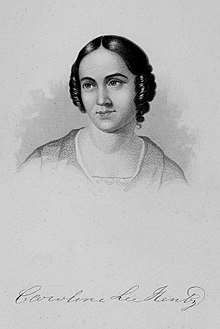
Pro-slavery was an ideology that promoted the practice of slavery and defended against any interference with the system.[1] By the 1830s, slavery was practiced mainly in the Southern United States.[2] African American slaves were considered property. Slave owners justified them being property because slaves were black—in other words not people. Slaves were used on large plantations and small farms as the primary form of labor.
Largely in response to the abolitionist arguments against slavery, pro-slavery advocates developed arguments to justify slavery as being a good thing.[3] While anti-slavery groups pushed for a gradual end to slavery, and free-soilers sought to stop its expansion, abolitionists demanded an immediate end to the practice.[3] Pro-slavery became as much anti-abolitionism as it was a defense of slavery.[3]
- ↑ "proslavery". Dictionary.com, LLC. Retrieved 13 June 2016.
- ↑ "Conditions of antebellum slavery, 1830–1860". WGBH/PBS Online. Retrieved 13 June 2016.
- ↑ 3.0 3.1 3.2 Africana: The Encyclopedia of the African and African American Experience, eds. Anthony Appiah; Henry Louis Gates, Jr. (Oxford; New York: Oxford University Press, 2005), p. 219
